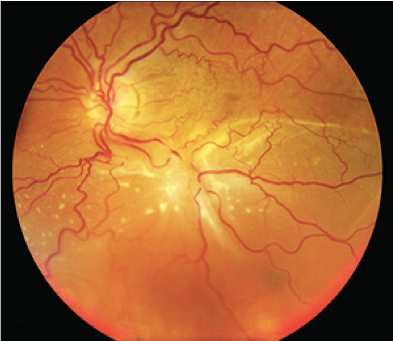Proliferative Vitreoretinopathy (PVR)
What is Proliferative Vitreoretinopathy (PVR)?
Figure 1. A typical example of a fixed “star fold” preoperatively.
Proliferative vitreoretinopathy is a retinal condition where scar tissue forms and leads to retinal detachment. The scar tissue membranes contract, stretching the retina and causing tears or holes in the retina. When the retina contracts a “star fold” develops, as seen in Figure 1.1 The exact cause of PVR is not completely understood, but research has shown that it is related to cell growth on the retinal surface.1 As liquefied vitreous gel passes through the tears in the retina subretinal fluid builds up and progresses retinal detachment.1 Proliferative vitreoretinopathy typically follows prior retinal detachment surgery with risk factors of more than one retinal tear, the leaking of blood into the vitreous gel cavity, separation of the choroid from the sclera, injury to the eye, and previous surgical interventions on the eye.1 PVR is also associated with retinal bleeding and tears, and open globe injury.
Signs and Symptoms1
For retinal traction, “floaters” or little light flashes
Loss of peripheral vision for patients with fluid accumulation under the retina
Central vision loss when detachment involves the macula
Elevated pressure and inflammation of the eye
Blindness
Treatment for Proliferative Vitreoretinopathy
Outside of retinal surgery, there is no medical intervention for PVR.2 Proliferative vitreoretinopathy is the main reason why approximately 10% of retinal reattachment procedures fail. The number of people affected in the United States is currently about 6,000 Americans per year, therefore PVR qualifies as an Orphan Drug Designation. The incidence of retinal detachment is about 5-10 per 100,000 people. 2
With this in mind, research and development for therapies are key to combating this condition.
reVision Therapeutics Seeks to Treat Proliferative Vitreoretinopathy
At reVision Therapeutics, our primary focus is to bring ophthalmic medicines rapidly to patients with unmet or poorly met disorders.
Our proliferative vitreoretinopathy candidate is a rescued molecule that did not meet the primary endpoint in a different retinal indication.
Learn more about reVision’s program in proliferative vitreoretinopathy.
References
Complex Retinal Detachment - Patients - The American Society of Retina Specialists. https://www.asrs.org/patients/retinal-diseases/34/complex-retinal-detachment.
Kwon, Oh Woong et al. “Retinal Detachment and Proliferative Vitreoretinopathy.” Developments in ophthalmology vol. 55 (2016): 154-62. doi:10.1159/000438972



